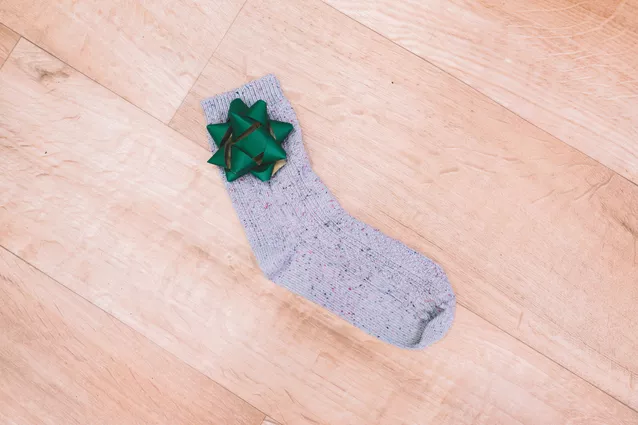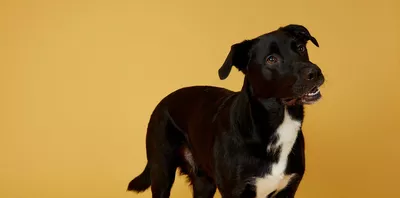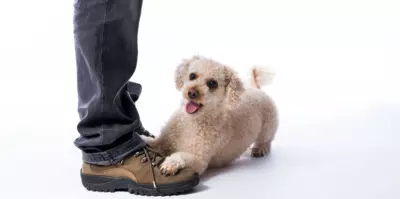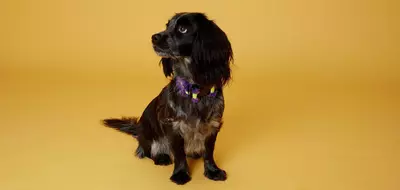Why Do Dogs Like Socks?
- 21 Sep 2023
- 4m read

When it comes to our pooches, there's no denying that they have some quirky behaviours.
One of these behaviours that often leaves dog owners scratching their heads is the inexplicable fascination with socks. Is it normal for dogs to chew on socks? Let's dive into this puzzling behaviour and try to unravel the mystery.
Is It Normal For Dogs to Chew on Socks?
Yes, it’s normal for dogs to chew on socks.
However, it can be dangerous.
Dogs are known for their inquisitive nature and playful tendencies. Chewing is a natural instinct for them, and socks, with their intriguing textures and scents, often make irresistible chew toys. But why do they do it?
Why Do Dogs Get Possessive of Socks?
Have you ever noticed your dog grabbing a sock and clutching it as if it were a precious treasure? This behaviour may seem odd, but it has its roots in their natural instincts.
Dogs are known for their strong sense of smell, and socks, well, they carry the unique scent of their beloved human companions. Dogs are drawn to the familiar scent of their owners, and socks, being in close contact with our feet, absorb these scents like a sponge.
In the wild, a dog's sense of smell is vital for survival. They use it to track prey, identify other animals, and locate food. So when your furry friend grabs a sock and holds onto it, it's their way of connecting with you through scent.
Moreover, dogs are pack animals, and they often use scent to establish and maintain social bonds within their pack. By holding onto your sock, your dog might be creating a scent link between you and them, reinforcing the emotional connection you share.
Why Does My Dog Take Socks and Hide Them?
The sock-snatching phenomenon doesn't stop at mere possession. Many dogs take it a step further by hiding socks in various nooks and crannies around the house. But why do they do this?
Instinctual behaviour
Dogs are natural scavengers. In the wild, they would hide their food to keep it safe from potential thieves or to store it for later consumption. This instinct has carried over into their domesticated lives, leading them to "bury" their prized possessions, like socks.
Playfulness
Dogs are playful creatures, and hiding socks can be a form of entertainment for them. It's like a game of hide-and-seek, where the sock becomes their treasure to find later.
Stress or anxiety
Sometimes, dogs may hide socks as a response to stress or anxiety. If they are feeling overwhelmed or uncertain, they might seek comfort in familiar objects, like socks, and hide them in a secluded spot.
Attention-seeking behaviour
Dogs are social animals and crave attention from their human companions. Hiding socks can be a way to get your attention, especially if they see that you react when you discover their secret stash.
Lack of proper chewing alternatives
Dogs have a natural urge to chew, and socks can become their chew toys of choice if they don't have suitable alternatives. Providing them with appropriate chew toys can help redirect this behaviour.
My Dog Ate a Sock But Is Acting Normal?
Now, what happens if your dog takes their sock obsession to the extreme and actually swallows one? It's a concerning situation, but the outcome may not always be as dire as you think.
Dogs are known for their strong digestive systems, but that doesn't mean they can safely ingest non-food items like socks. If your dog has eaten a sock and is acting normal, there are a few factors to consider:
Size of the sock
The size of the sock and the size of your dog matter. If the sock is relatively small, it may pass through their digestive system without causing any blockages.
Monitor your dog
Keep a close eye on your dog's behaviour. If they're eating, drinking, and having regular bowel movements, it's a positive sign. However, if you notice vomiting, diarrhoea, abdominal discomfort, or a lack of appetite, seek immediate veterinary attention.
Potential risks
In some cases, socks can cause gastrointestinal blockages, which can be life-threatening. If you suspect your dog has ingested a sock or any other foreign object, consult your veterinarian immediately.
Preventing Sock-Related Mishaps
To prevent your dog from turning socks into their favourite chew toys or snacks, consider the following tips:
Provide toys
Offer a variety of safe and engaging toys for your dog to chew on and play with. This will help divert their attention away from socks.
Supervise playtime
When playing with your dog, especially puppies, keep a close eye on them to ensure they don't sneak off with a sock.
Secure laundry
Make sure to keep dirty laundry in a hamper or a closed laundry room where your dog can't access it.
Training and obedience
Invest time in training your dog. Teaching them commands like "leave it" and "drop it" can be invaluable in preventing sock-related mishaps.




.png)